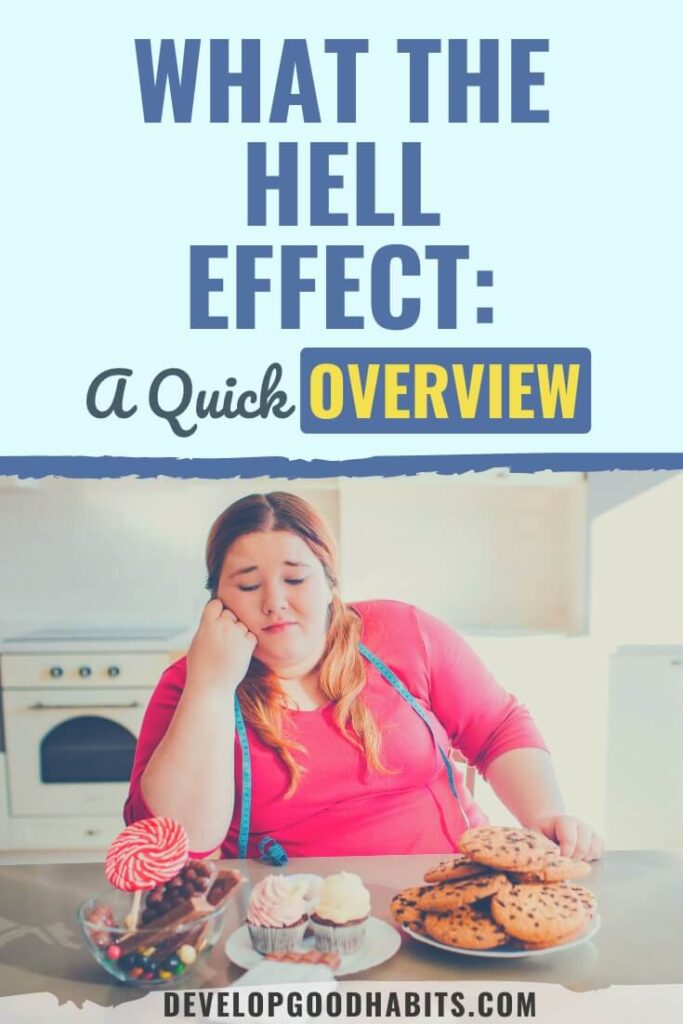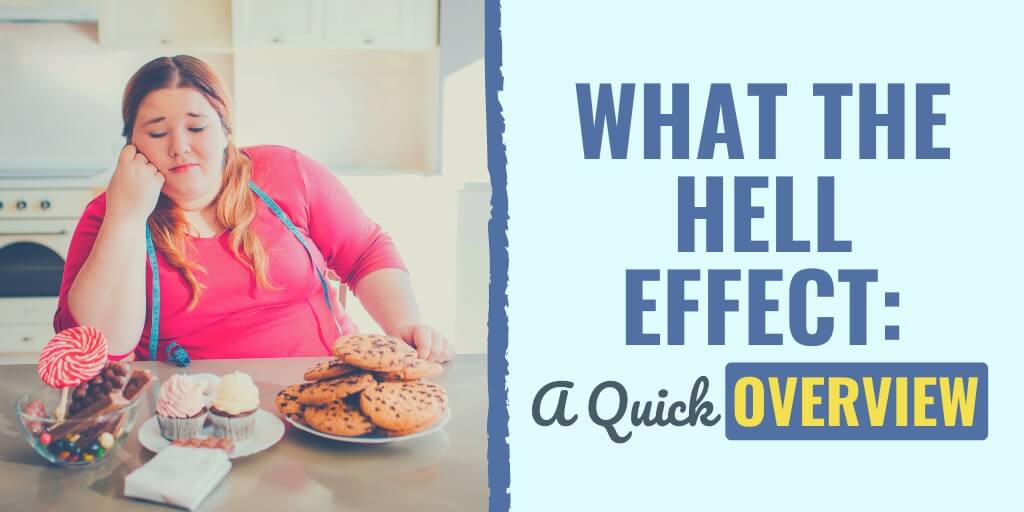There might be affiliate links on this page, which means we get a small commission of anything you buy. As an Amazon Associate we earn from qualifying purchases. Please do your own research before making any online purchase.
We've all been there…
You are trying, with all your willpower, not to eat bad food; but that slice of pizza is simply calling to you.
“Eat me, eat me,” the pizza is practically screaming. So your willpower snaps and you eat the slice.
Then what usually happens?
After that, do you chalk it up as a mistake and jump right back into your diet?
WRONG!!!
For most dieters the response is something like:
“What the hell! I've already screwed up, so I might as well enjoy my failure.”
Next thing you know you're knee deep in cardboard boxes, crusts, and empty coke cans after a weekend of binge eating pizza.
“What the Hell” Effect is a Real Problem
Obviously, I'm trying to be humorous here, but the “what the hell” effect is a very real problem that is anything but funny.
It can have a disastrous consequence on any type of restrictive habit change: Saving money, limiting alcohol consumption, eating, shopping, gambling or even an addiction to Facebook.
If you are changing a habit and you go over your “limit,” there is a really good chance that the “what the hell” effect will rear its ugly head. And once this happens you might slip into a bizarre behavior pattern that often results in complete failure.
Let me explain…
An Example of the “What the Hell” Effect
The “what the hell” effect can be found for any sort of goal-setting or willpower task, but it's most commonly found when people are dieting.
Numerous experiments have shown that when someone on a calorie restrictive diet goes “over” their limit, they are far more likely to over-indulge than someone who is on no diet at all.
Anyone who has tried to diet at some point can probably think of a time where they blew their diet in a spectacular manner. (This is one of the many reasons why “diet” is considered a bad word by many nutritionists because it focuses on short-term changes instead of a total modification of a behavior.)
The Root Cause of the “What the Hell” Effect
Willpower has no on/off switch. It is like a muscle. It can be built and strengthened through use, but it can also wear out and become fatigued. (This is also known as ego depletion.)
Everything you do that requires willpower, weakens your resolve and makes the likelihood of success at your next use of willpower less likely.
This is why it's important to not try more than one significant habit change at a given time. Trying to do too much weakens that willpower and makes the occurrence of a “what the hell” effect slip-up even more likely.
Find out more about the importance of Willpower in Baumeister and Tierney’s great book: Willpower.
How to Prevent the “What the Hell” Effect
If the “what the hell” effect is natural and something most people experience from time to time, how can it be prevented?
Here are four ways to minimize this problem:
1. Set specific short term goals.
Goals that last too long can weigh down willpower. By breaking them into smaller specific chunks (or short-term goals), you give your willpower the best chance for success.
The idea here is to create small wins that help you build emotional momentum, which helps you overcome those small “hiccups” that often occur with a major habit change.
2. Use accountability logs.
Don't fall into the trap of using yes/no outcomes with your habit changes. Mistakes happen. When you maintain an overall positive daily trend with a habit, it becomes easier to accept those small failures.
Simply take note of the mistake, record it in your journal and then move on. This is the best formula to NOT turn a minor mistake into a habit catastrophe.
Here are some great printable habit trackers to keep you accountable.
3. Understand the underlying problems.
Just the realization that you are engaging in “what the hell” effect thinking can help talk yourself down from a huge amount of backsliding.
Remind yourself not to turn a “little” mistake become a “big” mistake by remembering that everyone experiences some form of habit regression from time to time.
4. Turn goals into celebrations.
Alcoholics Anonymous does this to great effect. The ultimate goal is to limit drinking, but the celebratory goals are ANY days when you haven't drank.
This takes it from a limiting goal to a building goal by simply looking at the problem from a different perspective.
Final Thoughts on “What the Hell” Effect
If you desire to change your bad habits, the important thing to remember is we all encounter “what the hell” effect once in a while.
The simplest plan for avoiding it is to focus on one habit at a time, be specific in your goal setting, and understand that mistakes will happen.
When you realize you're experiencing this kind of mindset, you can avoid complete failure and simply have a “bad day” that's easy to overcome.
To learn more about this phenomenon (or if you're simply a visual learner), take a few minutes to watch the video below:
Finally, if you need help with building habits, then check out this nine-step blueprint that walks you through the entire process of creating lifelong habits.)



WtH effect is very dangerous at the beginning of creating a habit. The longer you practice, the better you know thyself.
Yesterday I had a BAD day at work. You know, one of THOSE days. I came back home and eat 3 hefty slices of cake. I shouldn’t. I have a sweet tooth.
But I stopped after 3 slices. I left the rest. It was unheard of me to leave a cake on the table just a year ago 😉
However now I know how much effort you need to burn this cake and how easily ‘a few slices’ can form a bulging gut. So I know what to avoid even at a BAD day.
While three slices of cake is a nice fall off the wagon, your point that you would have “normally” screwed up to the point of polishing off the whole thing is a key one. At least you limited it as much as possible.
Mistakes happen; we are all human. It is how you deal with them, and limit the “damage” that is key.
Thanks for a great “real world” example Michal
Hi SJ,
This was an excellent post on how to deal with the “what the hell effect”!
You are so right. One of the main reasons we can let this effect take over us, is because we’ve become overwhelmed by goals that are not specific, realistic and achievable.
I loved the tip you shared about accountability logs and making a note of the mistake we’ve made, and then moving on. I think writing down the mistake can really help to as you said, prevent us from turning it into a habit.
Thank you.
Hiten,
Absolutely. Different things drive different people, but having some sort of accountability is something that will encourage just about everyone to SOME degree or another.
-SJ
I have definitely experienced the “What The Hell” effect before. It can be pretty crippling if you’re not careful.
That’s why I’m so happy I’ve learned about habits and will power. Whenever I slip up on something like an exercise or sleeping too late, I’ll say “Oh shit, I better make sure I don’t do that tomorrow.”
We all make mistakes from time to time. It’s a part of life. As long as you can get back on the wagon you ensure you stay on track with the habit.
Really liking what you are doing over here SJ!
Agree with operative phrase there: “get back on the wagon.” I’ve found others (and sometimes myself) tread hiccups as some sort of catastrophe they can never come back from. Mistakes are mistakes and if you treat them as such it’s easier to come back the next day, more committed to the habit change.
Thanks a lot for this post man – very practical advice! I see the “what the hell” effect in myself and my housemates all of the time.
I think one of the reasons it exists so frequently in dieting is people see diet as a very short-term thing. I say to myself all of the time, “meh, I’ll just eat like crap today, feel bad for a bit, and then follow my diet 100%!” To me, spending is completely different, because unlike feeling like crap for a day, I will see less money in my bank account every day after I spend it.
Thanks for the post S.J.! I love how practical it is.
Good point about separating the two– You’re right about the spending thing. If you’re not careful, saying “what the hell” for purchases can have some serious long-term consequences.
BTW– Really like the angle of your site Chris. Just Tweeted out your article about the 4 gym hacks, useful stuff there!
i think the reason why the “What the Hell Effect” is so strong is because people get forming new habits wrong (in my eyes). they think “don’t break the chain” or “never slip up”, but why?
they want to get from sero to 100% perfect, from no habit to doing a new habit without fail everyday. but this is not possible sincce we’re humans. we fail even on doing our oldest habits from time to time. but we don’t make an elephant out of it. we notice it and go on.
trying to get to 100% perfect from the start puts a lot of pressure on you which makes it even harder. so if you slip one time you are not at 100% anymore and failed totally in your own eyes. but if you just think about getting better (like doing the new habit more often this week than last week, this month more often than last month) then slipping up 1 time is no failure and thus the “What the Hell Effect” won’t trigger.
I found this post really helpful. I’m working on getting rid of my bad habits one at a time. I’ve recently managed to stop being dependent on painkillers and now I’m trying to limit alcohol consumption. I must admit it’s a struggle. At my worst, I was having a bottle of wine every second night, but have gone three weeks without any at my best. At the moment, I’m slipping and sliding. I think my mistake is, as the previous poster said, I want to go from bad to perfect and when I’m not achieving that, I give myself a bad time with guilt and reproach. I’m going to try the smaller steps approach and try one week without any alcohol. I’ll start from today.
I like your books and the website. There is a lot of support here. Thank you.
Thanks for the comment Lesley. I know what you’re talking about…it’s easy to view a bad habit and try to reach perfection over night. The problem is when you slip, it’s easy to completely fall off the cliff and go into overdrive. I’d take it one step at a time, if you fail, just learn from the experience (like what triggered it) and start again.